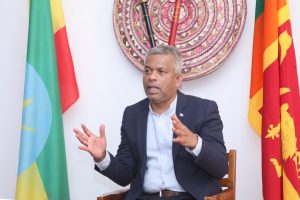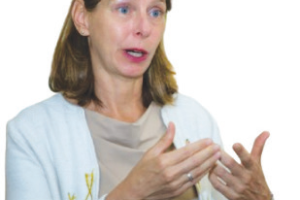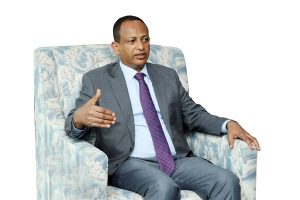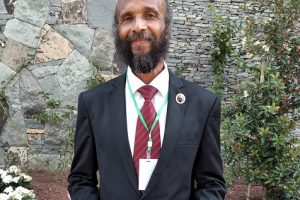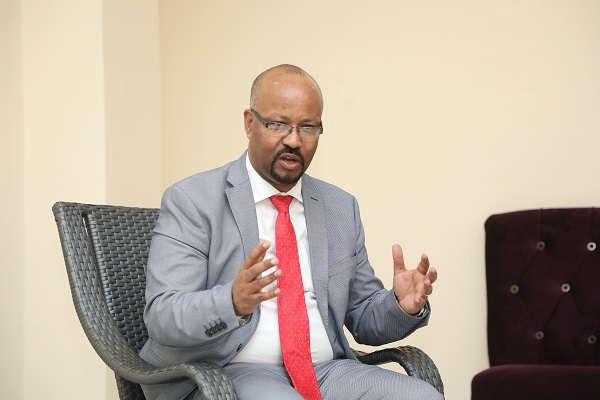
Endashaw Tasew (PhD), Chief Administrator of Central Ethiopia Region
The Ethiopian Press Agency stayed recently with the Chief Administrator to discuss various issues focused on national and regional affairs. The chief administrator raised detailed political, economic and social issues that concern his newly established region and national affairs. Have a good reading.
Would you explain core outcomes of prosperity party’s second regular congress?
Thank you very much for having me. Three major issues were considered at the 2nd congress of the prosperity party. One is the progress of the reform process during the past six years; where it was and where it is now. The second is evaluating how the decisions made by the 1st congress translated into action. And the third is decisions and direction set by the 2nd congress. All things are seen from this perspective.
Our beginning is all about what we have done so far. We have done a lot, but there have been gaps. There are targets we want to hit in the future so that our entire activities are exhibited in this framework. With this point of view, there have been three major issues that should not be missed in our agenda. Peace is the primary issue, and the remaining are development and democratic governance.
Regarding peace, our government from the very beginning, has taken the initiative and allowed all parties and individuals to come back to their country and engage peacefully in the country’s overall activities and contribute their share to the nation-building. Unlike the previsions experience of the country, this government has taken this measure to widen the democratic landscape.
The second major point indicates the unique character of this government. Our government did not multiply by zero all deeds performed by the former regimes including the Hailesilassie, Derg and EPRDF. Good performances and any valuable results were taken from all of them and efforts made to add new ideas.
The third major issue considered by the congress is development. In fact, we encountered problems in some parts of the country in this regard. We engaged in war. However, we could undertake the war and development activities simultaneously and registered up to 6.7% economic growth amid the challenges. This is testified not by us but by international institutions those conduct study based on standards. It is easy to forecast where we would arrive if there were no wars in some regions like Tigray, Amhara and some pocket areas.
Results we have registered amid these challenges deserve recognition. Not only this, we inserted new initiatives in the economic activities like wheat and rice production, Yelemat Tirufat (bounty of the table), projects undertaken under the Table for Sheger, Table for Country and Table for Generation, and the green legacy initiative among others.
We are not the only beneficiaries of these outcomes; but also others including Africa and the global world especially from the green legacy initiative. We have planted around eight billion saplings equals to world population during the past years. If we preserve these plants, they for sure will greatly contribute to the climate change mitigation program.
The other major issue is the correction of narration. This means making a balance between national identity (Ethiopianism) and nationalist identity. Nationalist and religious extremism has taken the upper hand during the past decades so that it was essential to correct these extremisms and take the middle way. The other world recognizes us as an Ethiopian but not as Amhara, Oromo, Gurage or any other nation so that we have to make a balance and Ethiopianism should get the right position and a lot has been done in this regard. Any kind of extremism is beneficial for none of us. We should choose the middle way that brings us to a common grand narration. This is a great shift in five years.
The other is crafting clear policy the country is led by. Based on experiences of past regimes that used to lead the country without clear policy for some time, the Prosperity Party has put in place clear policy and this is also a great shift. Some activities look paradox like conflicts in some parts of the country that some people consider as a failure of the government. But the reality is different. It is not because of our weakness. It is not because we could not control it; rather it is because we made everything open. It is to give chance democratic practices prevail widely. Amidst all these, there are sacrifices the government, the public and individuals pay. It is for good that gradually things will change for the better.
Among the eight position statements declared at the end of PP’s second regular congress is enhancing good governance. What is your comment on its performance as a nation and a region?
Good governance is a complement of all tasks. It incorporates service delivery, fighting corruption, clarity and fairness towards official activities of any institution; it is a broad idea. If we pick one issue as an example, service delivery, though our party has done a lot so far based on study, people are still complaining on some sectors in particular like land administration which is highly exposed to corruption.
As we learn from other countries, this gap is closed by the system. Unless we bring about structural transformation and establish strong institutions, these problems will not come to an end. Developed countries like America and China, for example, could establish systems so that people get any service without contact with persons. In our situation, the condition is different; there is high interpersonal contact and people are coerced to pay for a service they should get for free as per the legal framework. This truly needs correction and cooperation of all is essential. As we put in the second congress of our party, we are working on it and I am optimistic it will make progress gradually.
There is no difference between the federal government and regional states in this regard because all the tasks are applied at the regional level. For your information, discussions on the directions of the party are underway at all levels to have a common understanding. We have made discussions with party members and then with the entire public. Once the entire public is well aware of the party’s direction, the way will be smooth.
As you mentioned earlier, it is clear that there are some beginnings in creating common narration. What results you have seen so far and what do you think should be done for the future?
Common narration is a desire of everyone. It is nothing but an agenda of all that every one of us should march against. Today we are suffering of single narrations that magnify single local issue. In fact, there are essential single narrations. However, common narrations are not more than six or seven in number that we use to express Ethiopia. For example, the “American first” motto is common for all presidents regardless of their political outlook; there are untouchable issues; no negotiation on their national benefits. Likewise, there are common issues being crafted in our case but needs process.
To date, many issues, constructive or destructive, are encoded in our minds that easily trigger us for action. Some narrations we are accustomed to need correction. We have to modify those included in education, in religions and others. Everyone should focus on his/her own duty. We have to utilize institutions like schools, religious institutions and civic societies to transfer common narration. These are fundamental to sort out and enhance common narration among the community. They have to work collaboratively in an organized manner.
Single narrations never build a nation. Such movement will come to an end with mutual destruction. We have to catch viable agenda that brings us together and we are working on it seriously. Though it is tiresome, we have no other option. Nation building can be achieved only through common narration.
Activities are underway to become food self-sufficient as a nation and as a region and results are being registered. What more should be done to get rid of aid dependency as a country and as a region and what results are expected?
First, let’s define aid dependency. Aid dependency is a loss of sovereignty. It puts the nation’s sovereignty and security under question. We have been receiving aid so far in various ways because we couldn’t create wealth, and the wealth we created is destroyed by the wars we encountered at different times.
However, the position of our government is getting rid of aid. In our region, for instance, we could make 65% of our people free of aid. We made nothing special, but we made them engage in different economic activities like farming, poultry, animals’ fattening, and horticulture among others. We are working on enhancing agriculture, job creation, the manufacturing sector and changing people’s attitude in this regard. We are also supporting those in need of aid under some programs such as school feeding and elderly care because some sections of our community still need aid.
We no more stay aid dependent for the fact that some countries those used to provide aid are changing their mind. Fortunately, Ethiopia has made adequate preparation in advance. People should also get prepared psychologically. Citizens should focus on job creation. This is the area the government is working on with commitment. In the coming three years, for instance, we are working to create 9.5 million jobs as a national level. In our region, we will create 1.2 million jobs; 350,000 a year. We have to stop crying for aid from other countries; we are not their citizens; it is our duty to use our own resources.
Ethiopia is blessed in natural resources including vast arable land. If we properly cultivate our land, only one region can feed the entire country. Integrity is essential; we have to come together eliminating extra agenda that disturb us. We have to bring disturbing agenda to an end in two ways; dialogue and transitional justice. Though the problems are interconnected, we are breaking the shackle.
There are indications that you are doing well in the agriculture sector in your region. How did you come to such achievement and what other regions learn from your success?
Truly, we are not at that position. We need more effort. Though there are good beginnings, we shouldn’t be distracted with that. We are on good path in many sectors; but as per the question from our people, more effort is needed to finalize what we have started and stretch for more successes as a region and a country. Myriads of duties are ahead of us in terms of making accessible education, health services, and poverty reduction.
We need to intensify the initiatives in agriculture. Our farmers should focus on farming so that we are working on them to change their work habits. Nowadays, we are trying to produce four times a year using different mechanisms. Agricultural extension workers should also exert their maximum effort.
We never compromise negative energies that distract farmers from their duties. One is baseless information and the other is addiction; these should not replace their major tasks and we are working on awareness creation in this regard.
Nowadays, corridor development is underway throughout the country starting from Addis Ababa; how are you applying this program in your region?
We have begun corridor development. Our target is to develop 165 km in seven major cities; Butajira 25km, Hosaena 35km, Wolkite 25km, Worabe 25km, Saja 10 km, Durame 20km, Kulito 25km. These cities are the seven cluster cities. I hope we finalize by the end of June of this fiscal year.
The corridor development is underway with adequate standard and when it comes to an end, it will be great success even at the country level since 165 km is very large. Of course, it needs us more effort, commitment and participation of the entire community. It is beyond beautifying cities; it creates job for citizens; it serves for recreation; people can walk on clean roads; it upgrades the city’s competitiveness; so that the benefits are numerous.
We have crafted 90 projects in different cities that benefit the community like public toilets, libraries, youth centers, drug stores and the like that cost 1.4 billion Birr and benefits 2.5 million people. When we craft a project, we take into consideration how many people it benefits. Though it is at the beginning, it is on better way. People’s response is also very great; they accept with full heart and supporting the projects with all what they have including finance.
Economic reform is underway as a country and regional level and international institutions are bearing witness for its progress; do you think it is a viable policy direction?
It is viable. The way we measure this is based on various programs under performance that include political program, economic program, social affairs program, and foreign affairs program. These programs individually and cumulatively with synergy will help realize our prosperity goal.
We have good relations with the foreign world; we have no especial enemy so we are open to work with any country and institution without compromising our national benefits. Nowadays, we are touching what are once untouchable issues like access to the sea. Our population is estimated to be about 130 million so that sea access is a right question and this government dared to raise the question.
Therefore, the programs we set to transform the country all in all are viable. If some of these programs are compiled, they are beneficial even for other countries. But locally, there is misunderstanding among some entities but the success speaks by itself and all will come to appreciation at the end of the day.
How do you describe investment activities in your region?
We are beginners in investment. It will grow gradually. We have identified what we have. Our region has basically three sectors viable for investment; one is agriculture, and the others are minerals and tourism. Local and foreign investors are coming. So the beginning is promising.
What is the government working on to ensure that citizens’ are benefitting from governments services?
This is the major question. Unless Citizens get fair service in their country, there is a problem. There are sectors citizens get justified services. One is social service that includes education and health services. They should get fair share from the country’s resource. The other is political participation. Economic participation is also another core issue. This means the economic growth in each family and community must be balanced. There must be proportional growth among all communities. We provide necessary support and check the progress to ensure fair benefit.
If there is a problem in the country, it originates from lack of fairness. Whenever justice is ensured, problems will definitely minimize. So, citizens’ beneficiary is the center of all tasks.
Thank you very much for allowing us your time!
You’re most welcome!
BY BACHA ZEWDIE
THE ETHIOPIAN HERALD SATURDAY 15 MARCH 2025

